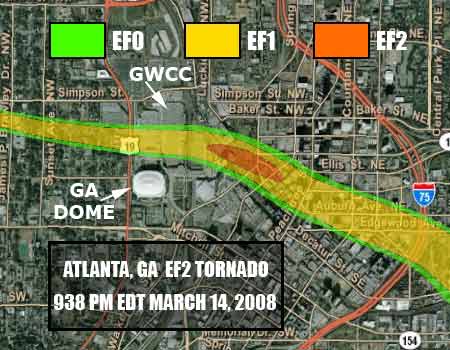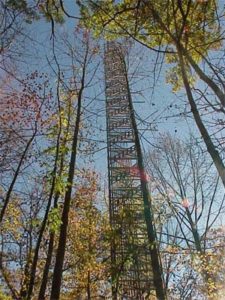In the evening of March 14, 2008, the Georgia World Congress Center where the 90th Annual Meeting of the AMS is taking place this year was hit by an EF2 tornado. The supercell thunderstorm that produced the tornado was unexpected that day, with an outbreak of tornadoes forecast for, and subsequently realized, the next day.

The adjacent Omni Hotel as well as CNN Center and a number of nearby hotels and buildings suffered significant damage in the tornado. CNN Center alone lost more than 1600 windows, and windows are still missing in the tube-shaped Westin Peachtree Plaza tower.
CNN was not broadcasting live from Atlanta that night with programming instead coming from its New York and Washington offices. If the 24-hour network had been live from CNN Center, “It could have been a classic You Tube moment,” says Brandon Miller, a weather producer for CNN International, adding, with “us in the center of the tornado, anchors looking all around, fear on their faces … Fortunately, that didn’t happen.” Miller says CNN didn’t cover the tornado strike itself live, but “covered the heck out of the damage afterwords.”
While this tornado event won’t be presented as part of Impacts: Weather 2009 at the 2010 AMS Annual Meeting, a presentation during this Tuesday session will look at Tornado Effects on a Rural Hospital: Impacts of an EF-3 Tornado that struck Americus, Georgia in March 2007 (2:00 PM, January 19, 2010, B206). A presentation Wednesday morning (9:15 AM, B217) will look at lightning characteristics of the Georgia tornado outbreak the day after the 2008 Atlanta tornado. Its author commented that lightning characteristics of the tornadic storm that struck Atlanta the previous day might also be presented, if time allows.
Also, a poster to be presented Monday will investigate the relationship, if any, between Southeastern tornadoes and drought. A climatological analysis of antecedent drought and spring tornadic activity will be available for viewing during the poster session Observed and Projected Climate Change from 2:30 – 4:00 PM Monday, January 18.
In And Around
Take a Dip in the Wild Ocean
If you haven’t gotten your fill of science at the meeting, there’s more at the Fernbank Museum of Natural History. The museum strives to inspire life-long learning of natural history through dynamic programming and interactive science displays.

Along with their permanent exhibits, this month features a special exhibit, “My Favorite Things.” For the exhibit, each department chose a natural history piece from storage to put on display. The exhibit by nature is designed to appeal to scientists of all ages and fields in its diversity.
Of special interest to oceanographers, “Wild Ocean” is playing at the IMAX theater. Filmed on South Africa’s wild coast, the movie touches on the balance not only between the oceans and people but the relationship between all living things. Showing through March 11, show times are Monday through Saturday 11:00, 1:00, 3:00, and 5:00, with a 9:15 p.m. showing on Friday; and Sunday 1:00, 3:00, and 5:00.
We would tell you about the 7 p.m. extra showing this Friday (shhh!), but instead that’s when Richard Somerville author of the AMS-published book, The Forgiving Air, will give a talk on climate change at the museum.
Looking for Snow in Atlanta?
Northeasterners and those from colder climates visiting Atlanta may be trying to escape the snow during the Annual Meeting. But for those who aren’t, there’s a place nearby to play. Stone Mountain Park’s Snow Mountain, Atlanta’s first snow park, is a virtual winter wonderland.
The park includes a tubing hill and a 30,000 square foot play area, filled with a blizzard of snow activities. Although the manufactured snow is icy compared to the fluff that occasionally falls in Atlanta, the warmer air temperatures allow for more comfortable outdoor play.
Originally planned to open in 2007, the park was widely criticized for its plans to use one million gallons of tap water during a drought. The plan was changed to use water from the park’s own lake and the park opened last year.
Georgia’s Got a Groundhog, Too
He may not be Punxsutawney Phil, but General Beau Lee is the groundhog to look to for the winter forecast in Georgia. Although he doesn’t make his official appearance until February, Beau’s home, the “Weathering Heights” mansion at Yellow River Game Ranch (www.yellowrivergameranch.com), is a good getaway destination this week if you’re looking for meteorological curiosities or trying to entertain the family.
Located just two and one-half miles east of Stone Mountain on Highway 78, the ranch offers an opportunity not only to meet furry weathercasters, but other animals on an up close and personal basis. Walk down a mile-long trail on 24 wooded acres, where over six hundred birds and animals indigenous to the state of Georgia reside.
Located on the banks of the Yellow River, the ranch was affected by the heavy rains and floods in September, but fortunately no animals, nor the mansion, were in danger and the ranch is back to functioning as usual.
The Yellow River Game Ranch is open from 10:00 to 5:00 Monday through Friday and 10:00 to 6:00 Saturday and Sunday. For more details visit the Web site.